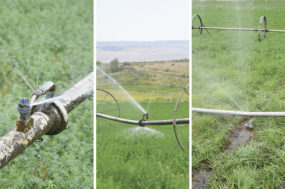The Idaho State Department of Agriculture (ISDA) has confirmed highly pathogenic avian influenza (HPAI) virus in a backyard flock of domestic chickens and ducks in Twin Falls County, Idaho. This is the first confirmed case of HPAI in domestic poultry this season.
While HPAI was detected in wild birds during the summer in Idaho, this is the first case in domestic birds confirmed by ISDA since May.
The ISDA strongly recommends poultry owners reinforce biosecurity measures for their flocks and prevent wild waterfowl from interacting with their domestic birds. Public venues where domestic poultry may come in contact with infected birds, such as livestock exhibitions or bird auctions, should also be avoided.
In April 2022, ISDA confirmed a public bird auction as the common source of HPAI infections for several backyard flocks after owners purchased birds and brought them home.
HPAI is carried by waterfowl (geese and ducks) along their migratory path. Idaho is within the Pacific Flyway. Domestic birds and poultry are very susceptible to morbidity and mortality once infected. HPAI is transmitted between birds through close contact (mucous), fecal matter and sometimes as an aerosol. It is often carried on objects such as tools, vehicles, clothes and boots, which can transfer the virus from one location to another.
It is uncommon for humans to become infected, but symptoms may include conjunctivitis, fever, lethargy, aches, coughing or diarrhea. Being in direct contact with domestic birds is the highest risk activity. When USDA guidelines for cooking are followed, HPAI is not a foodborne illness.
Poultry (domestic birds) information
Signs of HPAI in domestic poultry frequently include decreased appetite and activity, respiratory difficulty, dark combs and wattles, and unexplained mortality. It is essential for poultry owners to be vigilant in monitoring for illness and contacting the ISDA state veterinarian immediately when HPAI symptoms are confirmed. HPAI is a reportable disease in Idaho, and veterinarians are required to report positive detections to the ISDA.
The best form of flock protection is maintaining strong biosecurity standards. Biosecurity includes limiting the number of people who interact with your birds, washing hands before and after handling the birds, and having dedicated clothing and tools for each flock. More information can be found through the ISDA and the USDA.
Wild bird information
Anyone who comes across a sick or dead wild bird should refrain from interacting with it and should contact Idaho Fish and Game on the website.
—From an Idaho State Department of Agriculture press release
.jpg?t=1687979285&width=640)


.jpg?height=auto&t=1713304395&width=285)


